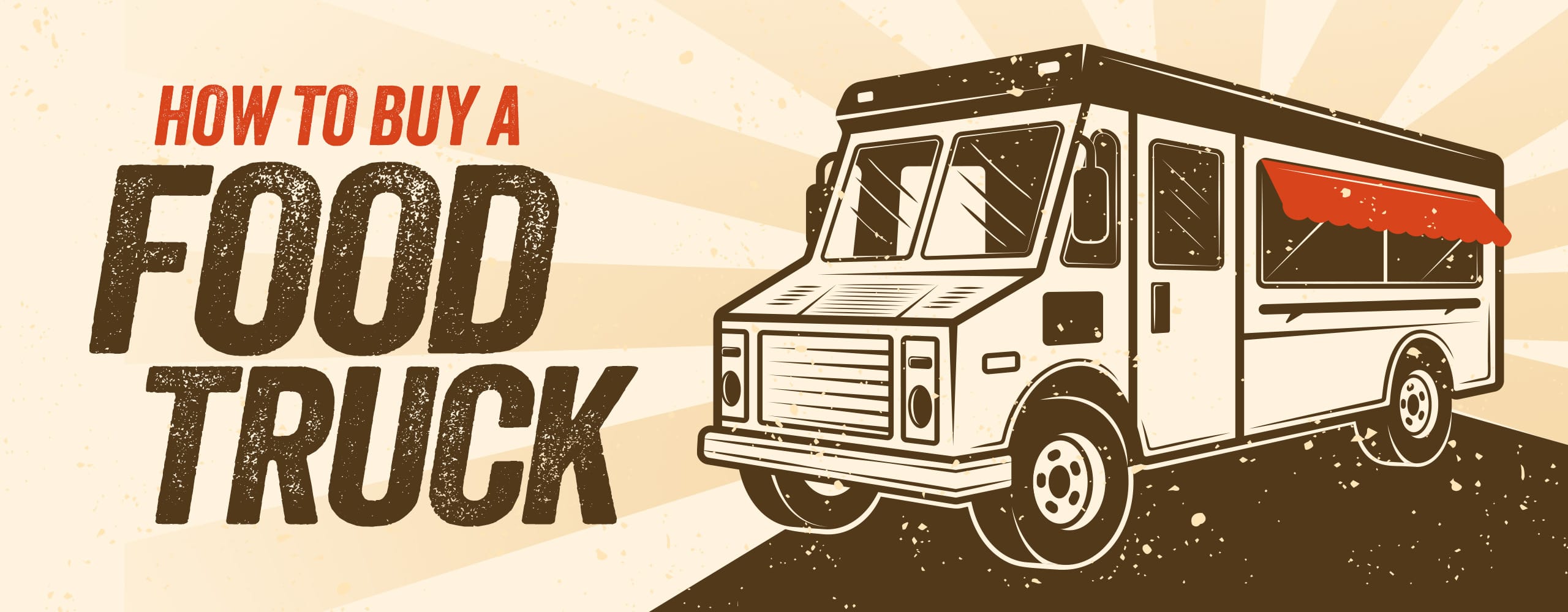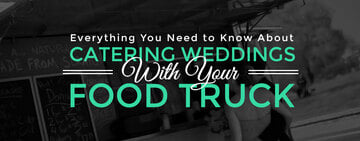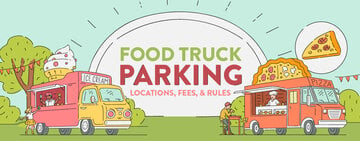
How to Buy a Food Truck
Last updated on 3/1/2024Whether starting a food truck business or looking to upgrade your existing one, finding the right truck is integral to your success. However, there is more to the process than just picking one out and driving off the lot. There are several different ways to buy a food truck, each offering unique advantages and disadvantages. Identifying a food truck that fits your price range, meets your culinary needs, and adheres to local regulations can be difficult, but understanding the options available can make the process easier. We'll examine the different ways to buy a food truck below so that you can prepare for your purchase.
Shop All Food Truck Supplies & EquipmentHow Much Does a Food Truck Cost?
In general, the cost of a food truck ranges from $50,000 to $250,000. This figure can fluctuate depending on the size, quality, and customization of your truck, as well as other factors. On average, a person should expect to spend $70,000 to $100,000. This price range includes the basic setup of a food truck with essential equipment and features.
- How much does a new food truck cost? New food trucks typically cost between $100,000 - $150,000.
- How much does a used food truck cost? Used food trucks typically cost between $50,000 - $100,000.
- How much does a converted food truck cost? Converted food trucks typically cost between $100,000 - $250,000.
- How much does leasing food truck cost? Leasing a food truck typically costs between $2,000 - $3,000 per month.
Steps to Purchasing a Food Truck
When it comes to buying a food truck, you might not know where to start. We've provided a detailed list of steps below to walk you through the process.
1. Choose a Food Truck Concept

Your food truck concept encompasses what kind of truck you'll operate, the foods on your menu, and a wide range of other details about your business. It should be clearly defined in your business plan and set in stone before you start shopping for a truck. Understanding your concept will guide your process and help curate a cohesive and appealing food truck experience, while failure to do so can result in poor decision-making. As you evaluate your concept, keep the following details in mind so that you can identify a truck that fits your preferences:
- Equipment: The food you plan to serve will dictate the food truck equipment you need. For example, if you're operating a burger truck, you'll need a grill, fryer, and refrigeration for storing meat and produce.
- Layout: Certain concepts require more prep space, while others prioritize cooking or storage space. For example, a food truck specializing in made-to-order sandwiches may need a larger prep area for assembling ingredients, while a dessert truck may need more space for displaying and serving treats.
- Branding: Your concept will influence the design, colors, and overall aesthetic of your truck. A food truck serving Mexican cuisine may opt for vibrant colors, while a health-focused truck may choose a clean and minimalist design.
2. Decide Which Type of Truck to Buy
There are three main ways to buy a food truck: buying one new, buying one used, and converting an existing vehicle. The best choice for you ultimately depends on your budget, how much you are willing to pay upfront, and your business needs. Consider the alternatives available to you and what the market looks like to get the best possible deal, and evaluate your options before making a final decision. Remember that there isn't one option that works better than the others, and each has its advantages and disadvantages.
Buying a New Food Truck
Purchasing a new food truck may be more expensive up front, but it can be worth it in the long run. From kitchen layout to equipment and storage space, many new food trucks can be custom-tailored to fit your requirements. New trucks are less likely to have mechanical issues or breakdowns and will likely last longer than other options. Many new food trucks come with a warranty, providing peace of mind that potential damage will be covered during the warranty period.
Whether building a food truck from scratch or buying a new one to customize, the process will take time. Specific requirements or design preferences may result in a longer construction process, and certain companies might run low on inventory. Additionally, the high cost of a new food truck makes it harder to upgrade in the future if you start to outgrow it.
Where to Buy a New Food Truck
There are several ways to buy a new food truck. Whether you prioritize customization, local support, or convenience, we'll explore some of the most popular options below so that you can choose the one that best fits your needs:
- Manufacturers: Food truck manufacturers allow you to design a truck that best fits your needs. You'll have direct input in your truck's design, allowing you to customize it to your specifications. Food truck manufacturers exist on both a national and local scale, ensuring that you find a company you're comfortable working with.
- Specialty websites: Certain websites allow you to design a truck or purchase a new one from a selection of models. These platforms provide more options and allow you to easily compare different types to find the one that best suits your needs and budget.
Buying a Used Food Truck
Purchasing a used food truck is a practical option for those who can't afford the hefty investment of a new vehicle. They offer a great opportunity for newcomers to test the waters and determine if the food truck business is the right fit. Used food trucks are initially cheaper than new trucks, allowing businesses to control their initial startup expenses. Many come with pre-installed kitchen equipment, making it easy to evaluate their layout and functionality.
Used food trucks carry a higher risk of needing repairs or maintenance and may have unknown wear and tear, leading to unexpected issues down the line. They generally have a lower life expectancy, meaning you'll have to buy another truck sooner rather than later. Some vendors may be hesitant to work on a used truck since previous modifications may be unknown, making it difficult to modify your truck.
Where to Buy a Used Food Truck
When purchasing a used food truck, there are two primary options to choose from: individual owners and used food truck websites. We'll introduce each option below:
- Individual owners: Individual owners looking to exit the food truck business may be open to selling their trucks directly to prospective buyers. This offers a more personalized approach, allowing you to potentially negotiate a better deal and ask questions about the history and condition of the truck.
- Used food truck websites: These websites typically feature a wide selection of trucks with varying specifications and price points, providing buyers with a diverse range of options. They offer a convenient and efficient way to browse multiple listings and compare trucks.
Buying a Converted Food Truck
Converted food trucks are unique vehicles modified to serve food. Inspired entrepreneurs have converted a wide range of vehicles, including vans, boats, trolleys, and even fire trucks. This creative approach allows your business to stand out from the competition and create a memorable experience for your customers.
Acquiring and converting an existing vehicle requires substantial work to ensure it is up to food truck standards and complies with health and safety regulations. If you already own a suitable vehicle, opting for a converted food truck can be cost-effective. Working with a professional conversion company can streamline the process and ensure your vehicle meets all necessary standards.
Where to Buy a Converted Food Truck
Whether you're in the market for a vehicle that has already been converted or are seeking one to convert yourself, there are various avenues to explore:
- Individual owners: If you're looking to find unique, customized vehicles that already have the equipment you desire, shopping from an individual owner is a good place to start. These owners have already put in the work of converting the vehicle, so it will likely require minimum customization.
- Food truck websites: These websites often have a wide selection of vehicles to choose from, allowing you to browse styles and layouts.
- Auctions: Some auction houses may feature unique vehicles to bid on. You may be able to get these vehicles for a reduced price and convert them yourself.
3. Inspect the Vehicle

If you think you've found the right vehicle, inspect it before entering negotiations. Conducting a detailed inspection and test drives allows you to gather more information before making a purchase and avoid making a bad investment. You can make sure it handles correctly, meets your needs, and that there are no hidden issues that may have gone unnoticed. Verify that the details below meet your standards before closing on a deal:
- Power: Make sure that the power is working correctly. No matter what kind of generator your truck uses, it's essential to make sure it can support all of your appliances.
- Floor plan: Verify that there is enough space in the truck for you and your staff to work efficiently. A well-designed floor plan can contribute to the smooth operation of your food truck business.
- Appliances: Inspect the appliances that come with the food truck, if any, to ensure they are in good condition. Built-in equipment and appliances should run effectively to support your food preparation and service needs.
- Driving performance: A successful test drive will give you confidence in the vehicle's reliability on the road. Ensure that the truck runs well and that you are comfortable driving it.
- Damage: Inspect the food truck for any wear and tear that may not have been initially noticeable. Identifying any damage early on can help you make an informed decision about the vehicle's condition and potential maintenance needs. If the truck is more damaged than you initially thought, you may have to pay more in insurance costs.
4. Negotiate a Sale
Whether purchasing a new or used food truck, the negotiation process is crucial in ensuring you get the best deal possible. If you are buying a new food truck, the manufacturer may be willing to work with you to tailor the vehicle to your specific requirements while staying within your budget. On the other hand, when negotiating for a used food truck, finding a price that satisfies both parties is key. Researching the market value of similar vehicles can provide you with leverage during negotiations. Keep the following tips in mind to get the best deal possible for your food truck:
- Be objective: Purchasing a food truck is a significant investment, and the process can be stressful. Emotions can cloud your judgment, so focus on the facts and figures rather than how you feel.
- Get pre-approved for financing: If you plan to finance your food truck purchase with loans, obtaining pre-approval can streamline the process and demonstrate your credibility as a buyer. This may give you an advantage over other prospective buyers.
- Start low and negotiate: Begin with a reasonable but competitive offer. From there, be prepared to negotiate back and forth until you reach a mutually satisfactory agreement.
- Don't be afraid to walk away: If negotiations are not progressing favorably, don't hesitate to walk away. Avoid forcing yourself into an agreement that does not align with your needs or budget.
5. Customize Your Food Truck

No matter what kind of food truck you buy, it will require customization. Whether that is something simple like swapping out equipment or something more extensive, such as redesigning the truck to match your brand, the important thing is to make sure you have everything you need for your business to succeed. We've listed some of the most common ways that new food truck owners customize their vehicles below:
- Specialized equipment: To effectively prepare the foods on your menu, you will need to invest in specialized equipment tailored to your menu items. This may include commercial-grade cooking appliances, refrigeration units, storage containers, and food preparation stations.
- Food truck exterior: The exterior of your food truck serves as the first impression for potential customers and is the easiest way to catch their eye. Consider incorporating your logo, brand colors, and graphics that convey the type of cuisine you offer. A visually appealing exterior can help create a memorable and inviting experience.
- Special features: Depending on your location and concept, you may want to invest in features that enhance the functionality and appeal of your food truck. This can include awnings or umbrellas to provide shade for customers, speakers to play music or announce specials, and menu boards to display your offerings.
Back to Top
Buying a food truck is a significant investment that requires thorough research, time, and financial commitment. Before diving into the process, it is essential to understand the expectations and requirements involved to ensure a smooth and successful transaction. By adhering to the information above, you can position your food truck business to succeed.






